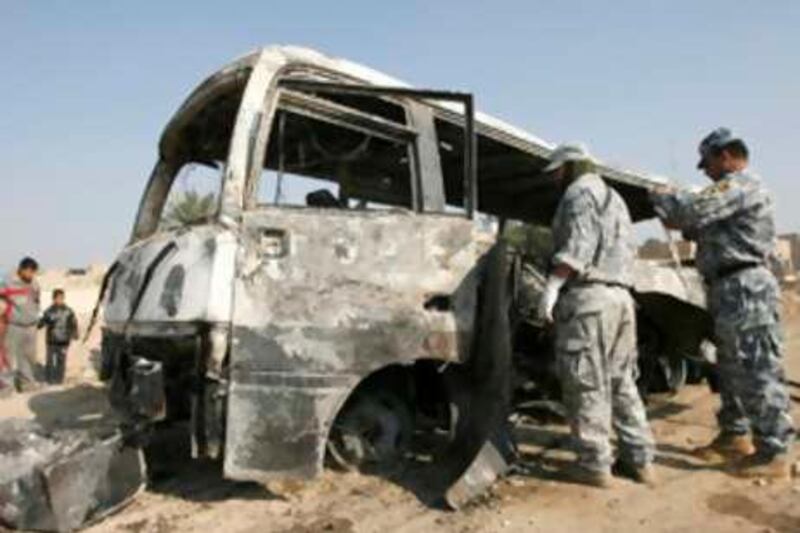Baghdad // The Iraqi capital was hit by three deadly explosions today, including an attack on the headquarters of the national intelligence services by a female suicide bomber. She triggered her explosive vest in the entranceway to the intelligence bureau's offices, near Baghdad's heavily guarded Green Zone, killing five and injuring 17 as they queued to pass through security checkpoints.
Less than an hour earlier, 13 civilians were killed when a bomb destroyed a bus. The passengers were on their way to work at the ministry of trade. The explosion ignited the bus's fuel tank, incinerating the passengers on board. Nine of the dead were women, according to medical officials. Five passengers sustained injuries. The blast is thought to have been caused by a magnetic bomb. They are increasingly being used to assassinate government employees and security officials.
A third bomb, in east Baghdad, killed two and wounded four, including three police officers. Despite recent improvements the in security situatioin, Baghdad remains a dangerous city and bombings are a regular occurrence. Over the three days before yesterday's attacks, at least 10 bombs exploded in the capital, injuring dozens. Such bombings, however, receive little media attention as they do not produce high death tolls.
today's attacks served as a stark reminder of how vulnerable Baghdad is to insurgency. The last major attack on the Green Zone, which houses Iraq's parliament, several government offices and foreign embassies, took place on Oct 7, when two bombs killed seven, including an Iraqi soldier. "There are still safe havens for al Qa'eda and there are still people who think that bombings are the only way to end the occupation," Sheikh Shugaa al Adhami, a leader of a sahwa council in west Baghdad's Ghazaliya district, said in an interview.
The councils have been credited with much of the improvement in security, after they decided to stop fighting the US military and instead combat al Qa'eda-inspired militants. "We've seen more and more involvement by women in suicide bombings because al Qa'eda know that it is a weak spot for Iraqis," Sheikh Adhami said. "As they have had success with it we can expect to see more of this tactic." Iraqi custom makes it difficult for the police and army to search women.
The latest bombings came just before tomorrow's scheduled parliamentary vote on a controversial military pact with the United States. Under the terms all US combat troops are to withdraw from Iraqi cities by next summer and to leave the country entirely by the end of 2011. Nouri al Maliki, the Iraqi prime minister, spent more than a year negotiating the terms of the deal with Washington and insists that, although flawed, it is the best compromise between maintaining stability and giving a clear timetable for a US pullout.
But it faces heavy opposition, including from the powerful Sadrist parliamentary bloc, led by Muqtada al Sadr, the nationalist Shiite cleric. Tens of thousands of protesters took to the streets of Baghdad and other Iraqi cities on Friday to oppose the deal. Iran and Syria have also called for its rejection, saying only an immediate withdrawal of US troops is acceptable. Various Iraqi political parties are still haggling over the pact and it remains unclear if it will get the necessary majority for the passage. Some Iraqi legislators are thought to support the agreement but are planning to stay away from the vote because they do not want to be seen as supporters of a continued US occupation.
Mr Maliki has warned that US troops will be told to leave the country immediately if the pact is not approved. A potential problem is that even if the deal does pass through parliament, but only by a narrow margin, it will not be viewed as representing a real mandate for a continued US military presence. Another possibility is that only Kurdish and Shiite Arab MPs from the ruling political bloc will back the plan - with Sunnis and the Sadrists refusing to support it. That will further undermine any claim the pact has a true cross-community legitimacy. Hamad al Attiya, a leader in the Sadrist movement, condemned yesterday's suicide bombing as he blamed al Qa'eda. But he said the ultimate responsibility for it lay at the feet of the US military.
"These bombings by women only occur in the face of occupation and colonisation," he said in an interview. "Attacks will persist for as long as foreign troops are in Iraq; it is a sign of the Iraqi people's rejection of occupation. "There are many bombings and many clashes that happen daily. These are not the only ones. The Iraqi state and the military is weak and cannot stop these attacks." Baghdad residents said they were bracing for continued unrest. "The police and the army are getting stronger and are doing much to maintain safety," said Dhafer al Qaysi, the associate dean of political science at the University of Baghdad. "But these explosions are not isolated; they are part of an ongoing process. Sometimes it is relatively peaceful here, sometimes it is not."
nlatif@thenational.ae





